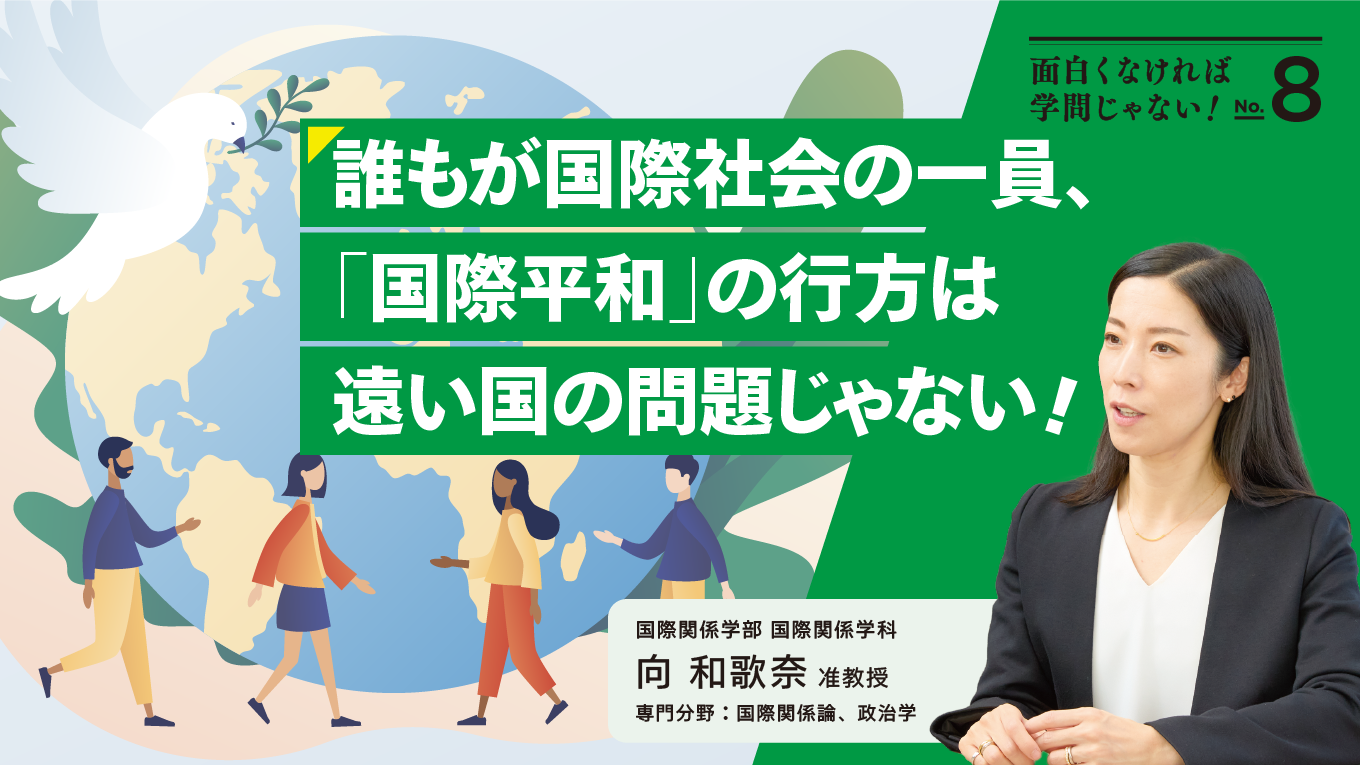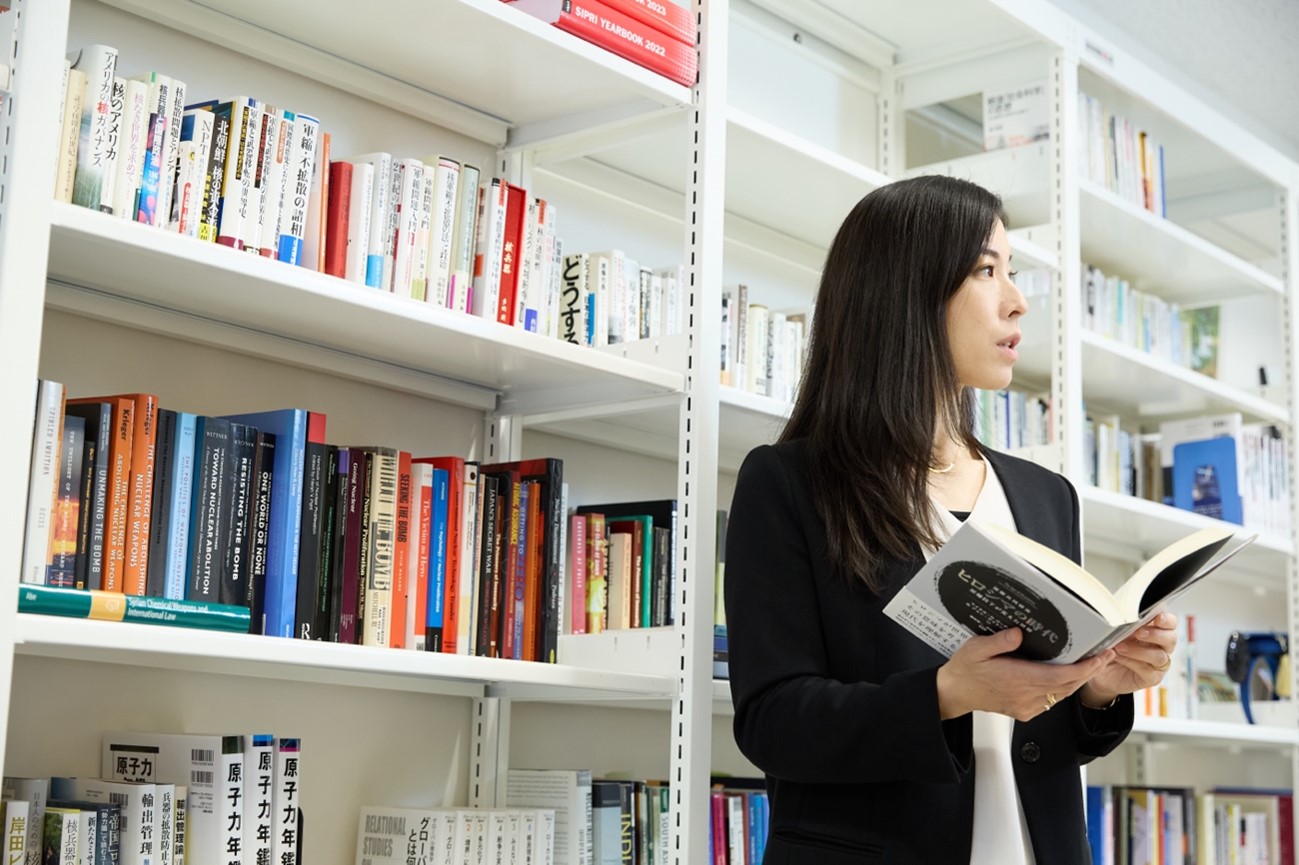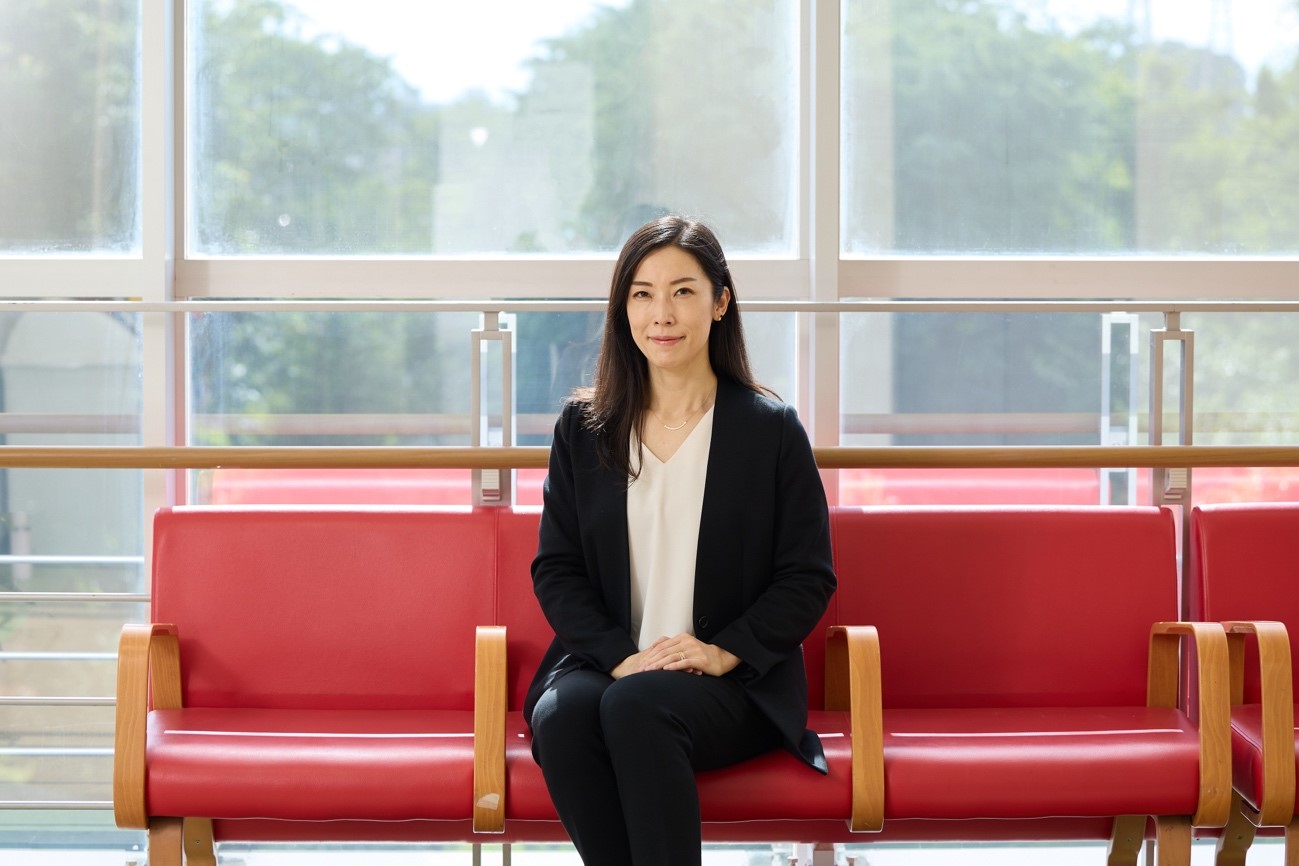
Everyone is a part of the international community.
The Future of "International Peace"
It's not just a problem in a faraway country!
The Future of "International Peace"
It's not just a problem in a faraway country!


#Asia University research
MUKAI Wakana Associate Professor
Faculty of International Relations Department of International Relations
2024.08.01
In the series "If it's not interesting, it's not academia!", we introduce research content and anecdotes of faculty members at Asia University. The eighth feature is Faculty of International Relations Department of International Relations MUKAI Wakana Associate Professor is.

I wanted to know how the world works.
Eventually, I became interested in how the world works and how it works, starting with my "Politics and Economics" classes in high school. My interest in international politics in particular grew, and I entered the Tokyo University of Foreign Studies, Department of Foreign Studies, majoring in English, as it was a university where I could study international politics while improving my English skills. In my third and fourth years, I joined the long-awaited international relations seminar and broadened my knowledge of the international community. During this time, I happened to read a special feature in a newspaper article and learned about the initiative "Nuclear Weapon-Free Zones." I wanted to know more about the fact that the military and political power of "nuclear weapons" has shaken international politics, and the efforts of the international community for peace in response to that, so I wrote Bachelor’s Thesis on this topic. In the process, I borrowed materials that were not available at my university from Library (Library Administration) at other universities, and even went to Osaka University to speak with a leading expert on nuclear disarmament research.
When thinking about my future after graduating from university, I wanted to work for a UN organization or some other organization that could contribute to the realization of a "world without nuclear weapons." To do so, I needed to obtain at least a master Master’s Degree at Graduate School. So after graduating from university, I went on to Graduate School of Tokyo. Under the guidance of Professor Kiichi Fujiwara, a leading authority on international politics, I conducted research on international politics surrounding nuclear weapons, focusing in particular on the aspect of nuclear disarmament, and (although it took a long time) I eventually obtained a Doctor’s Degree.
What are the international community's efforts toward nuclear disarmament?

Having been trained as research in Graduate School, I worked as research at a think tank before coming to teach at Faculty of International Relations Asia University.
Since becoming a university professor, I have realized that I love teaching. At the same time, I am also keenly aware of the difficulties of teaching. University professors, including myself, are people who have built their careers as research, and in many cases, they do not hold teaching licenses, which are a proof of professional teaching, like high school teachers. Instead, each of us is a "professional (expert)" in our own field. Every day, I try to think of ways to teach the issues of international politics and nuclear disarmament, which I have been interested in and research, in an easy-to-understand way so that students can see them as "their own problems."
In the undergraduate courses "Introduction to International Politics" and "International Security Theory," we explain the significance of studying international politics and the main issues at stake. "Global Governance" is a course for advanced students that is taught entirely in English. In seminars for third and fourth year students, the theme is "Considering the world from a security perspective," and I have many discussions with students about my field of expertise, such as nuclear disarmament and arms control. I don't just teach my students; conversely, I often learn from our discussions.
We all understand that nuclear weapons are a great threat to humanity. Especially those of us who live in countries that have been bombed with atomic bombs during wartime have learned from childhood about the enormity of the damage they cause.
Nevertheless, even now, 80 years after the atomic bombing, the world remains exposed to the threat of nuclear weapons. Of course, the international community has not been sitting idly by. The Treaty on the Non-Proliferation of Nuclear Weapons (NPT), which came into force in 1970, accepts the reality that nuclear weapons already exist in the international community, and is based on three pillars: "nuclear disarmament" (an effort to reduce nuclear weapons, mainly among the five countries (USA, Russia, UK, France, and China) that are allowed to possess nuclear weapons under the NPT), "nuclear non-proliferation" (an effort to prevent the further spread of nuclear weapons and related equipment and technology around the world), and "peaceful uses of nuclear energy" (a guarantee of the inalienable right of the contracting parties to use nuclear energy for peaceful purposes). 191 countries have joined the treaty. However, in addition to these five countries, there are a total of nine countries that possess nuclear weapons, including Pakistan, India, North Korea, and Israel. The existence of a treaty is not a simple structure that will solve the problem. In response to this situation, the international community continues to make various efforts to reduce the number of nuclear weapons.
Since becoming a university professor, I have realized that I love teaching. At the same time, I am also keenly aware of the difficulties of teaching. University professors, including myself, are people who have built their careers as research, and in many cases, they do not hold teaching licenses, which are a proof of professional teaching, like high school teachers. Instead, each of us is a "professional (expert)" in our own field. Every day, I try to think of ways to teach the issues of international politics and nuclear disarmament, which I have been interested in and research, in an easy-to-understand way so that students can see them as "their own problems."
In the undergraduate courses "Introduction to International Politics" and "International Security Theory," we explain the significance of studying international politics and the main issues at stake. "Global Governance" is a course for advanced students that is taught entirely in English. In seminars for third and fourth year students, the theme is "Considering the world from a security perspective," and I have many discussions with students about my field of expertise, such as nuclear disarmament and arms control. I don't just teach my students; conversely, I often learn from our discussions.
We all understand that nuclear weapons are a great threat to humanity. Especially those of us who live in countries that have been bombed with atomic bombs during wartime have learned from childhood about the enormity of the damage they cause.
Nevertheless, even now, 80 years after the atomic bombing, the world remains exposed to the threat of nuclear weapons. Of course, the international community has not been sitting idly by. The Treaty on the Non-Proliferation of Nuclear Weapons (NPT), which came into force in 1970, accepts the reality that nuclear weapons already exist in the international community, and is based on three pillars: "nuclear disarmament" (an effort to reduce nuclear weapons, mainly among the five countries (USA, Russia, UK, France, and China) that are allowed to possess nuclear weapons under the NPT), "nuclear non-proliferation" (an effort to prevent the further spread of nuclear weapons and related equipment and technology around the world), and "peaceful uses of nuclear energy" (a guarantee of the inalienable right of the contracting parties to use nuclear energy for peaceful purposes). 191 countries have joined the treaty. However, in addition to these five countries, there are a total of nine countries that possess nuclear weapons, including Pakistan, India, North Korea, and Israel. The existence of a treaty is not a simple structure that will solve the problem. In response to this situation, the international community continues to make various efforts to reduce the number of nuclear weapons.
The long and difficult road to a nuclear-weapon-free world

In 2009, in Prague, the capital of the Czech Republic, then US President Barack Obama declared the US's determination to take the lead in pursuing "a world without nuclear weapons" and outlined specific goals for achieving this. This "Prague Speech," in which he mentioned the moral responsibility of the US as the only nuclear power to have used nuclear weapons, touched the hearts of people around the world, and President Obama was awarded the Nobel Peace Prize that same year.
In 2017, the Treaty on the Prohibition of Nuclear Weapons, the first international treaty to comprehensively legally prohibit nuclear weapons, was adopted (it will come into force in 2021).
In 2023, at the G7 Summit held in Hiroshima, the site of the atomic bombing, the first joint document by G7 leaders focusing on nuclear disarmament, the G7 Leaders' Hiroshima Vision on Nuclear Disarmament, was announced. I believe it was of great significance that the G7 leaders had the opportunity to visit the Hiroshima Peace Memorial Museum and hear directly from atomic bomb survivors. There was also a deep sentiment expressed by Prime Minister Kishida Fumio, who is from Hiroshima.
However, the reality is that the road to a "world without nuclear weapons" is still a long and difficult one. Ukrainian President Zelensky, whose country has been invaded by Russia, also attended the G7 Summit in Hiroshima, and in response to the situation in Ukraine, Russian President Putin recently ordered the implementation of Seminar with tactical nuclear weapons with a range that can reach Europe. Furthermore, in the Gaza Strip in Palestine, where tensions are high, an Israeli cabinet minister has stated that "dropping an atomic bomb is one option," as the country intensifies its offensive against the Islamic organization Hamas.
For Japan, the possibility of an invasion of Taiwan by nuclear-powered China, the possibility of a nuclear Laboratory Work by North Korea, and even a missile Laboratory Work by North Korea into the Sea of Japan are major issues of national security. The only way to realize a "world without nuclear weapons" is for each of us living on planet Earth to recognize that we are a global community of shared destiny and to persevere step by step toward peace for the sake of our descendants 100 years from now. To achieve this, the "education" Department of International Relations provides, which cultivates peace-minded "people" through learning in various fields such as political systems, international law, diplomacy, development cooperation, economics, and business, as well as international politics, is an extremely important factor.
In 2017, the Treaty on the Prohibition of Nuclear Weapons, the first international treaty to comprehensively legally prohibit nuclear weapons, was adopted (it will come into force in 2021).
In 2023, at the G7 Summit held in Hiroshima, the site of the atomic bombing, the first joint document by G7 leaders focusing on nuclear disarmament, the G7 Leaders' Hiroshima Vision on Nuclear Disarmament, was announced. I believe it was of great significance that the G7 leaders had the opportunity to visit the Hiroshima Peace Memorial Museum and hear directly from atomic bomb survivors. There was also a deep sentiment expressed by Prime Minister Kishida Fumio, who is from Hiroshima.
However, the reality is that the road to a "world without nuclear weapons" is still a long and difficult one. Ukrainian President Zelensky, whose country has been invaded by Russia, also attended the G7 Summit in Hiroshima, and in response to the situation in Ukraine, Russian President Putin recently ordered the implementation of Seminar with tactical nuclear weapons with a range that can reach Europe. Furthermore, in the Gaza Strip in Palestine, where tensions are high, an Israeli cabinet minister has stated that "dropping an atomic bomb is one option," as the country intensifies its offensive against the Islamic organization Hamas.
For Japan, the possibility of an invasion of Taiwan by nuclear-powered China, the possibility of a nuclear Laboratory Work by North Korea, and even a missile Laboratory Work by North Korea into the Sea of Japan are major issues of national security. The only way to realize a "world without nuclear weapons" is for each of us living on planet Earth to recognize that we are a global community of shared destiny and to persevere step by step toward peace for the sake of our descendants 100 years from now. To achieve this, the "education" Department of International Relations provides, which cultivates peace-minded "people" through learning in various fields such as political systems, international law, diplomacy, development cooperation, economics, and business, as well as international politics, is an extremely important factor.
It is each individual's "power of thought" that creates a peaceful world

When I surveyed students taking my classes, many of them said that they had become interested in learning more about international politics and nuclear weapons as a result of events such as Ukraine, the Gaza Strip, and North Korea's missile Laboratory Work. Students who learned about what was happening in Ukraine and the Gaza Strip through the news must have been made to realize that conflicts between power do not create a peaceful world. "Why do conflicts arise between countries?" "Why can't we eliminate nuclear weapons that could destroy humanity?" "Why are young people of our generation suffering so much?" I want to send as many students out into the world who are aware of these issues, who see what is happening in the world as their own problem, and who have the ability to think clearly for themselves.
This is because the course of international politics as a whole, including the issue of nuclear weapons, is directly linked to the state of domestic society, the economy, finance, and even energy issues, and will greatly affect the future of students. University students over the age of 18 have already been handed the "baton" to create a peaceful world. One of the actions that will connect them is "going to the polls." Although there are concerns about a decline in voter turnout these days, in my seminar we thoroughly discuss the meaning of voting, and everyone casts their vote for the candidate they expect will create a better society based on their own ideas. I hope that as many people as possible will be raised to take advantage of what they learn in classes and seminars and to think and act for themselves.
I said earlier that I "like teaching," but to be more precise, I "like watching students grow right before my eyes." I am honored to be a university professor, as I can discover the seeds of talent within my students, help them develop them, and help them prepare to enter society. I will continue to hone my skills as an expert, so that I can live up to them, and contribute, however small, to the realization of a "world without nuclear weapons." Every year, I renew this feeling as I watch many students grow and leave the nest to enter society.
This is because the course of international politics as a whole, including the issue of nuclear weapons, is directly linked to the state of domestic society, the economy, finance, and even energy issues, and will greatly affect the future of students. University students over the age of 18 have already been handed the "baton" to create a peaceful world. One of the actions that will connect them is "going to the polls." Although there are concerns about a decline in voter turnout these days, in my seminar we thoroughly discuss the meaning of voting, and everyone casts their vote for the candidate they expect will create a better society based on their own ideas. I hope that as many people as possible will be raised to take advantage of what they learn in classes and seminars and to think and act for themselves.
I said earlier that I "like teaching," but to be more precise, I "like watching students grow right before my eyes." I am honored to be a university professor, as I can discover the seeds of talent within my students, help them develop them, and help them prepare to enter society. I will continue to hone my skills as an expert, so that I can live up to them, and contribute, however small, to the realization of a "world without nuclear weapons." Every year, I renew this feeling as I watch many students grow and leave the nest to enter society.
Related Links
- Faculty of International Relations TOP
- Introduction to Faculty of International Relations Department of International Relations
- 4 years of study Faculty of International Relations Department of International Relations
- Introduction to classes in Faculty of International Relations Department of International Relations
- Faculty of International Relations Department of International Relations Seminar
- Faculty of International Relations Department of International Relations Expert English Program
- Faculty introduction Faculty of International Relations Department of International Relations